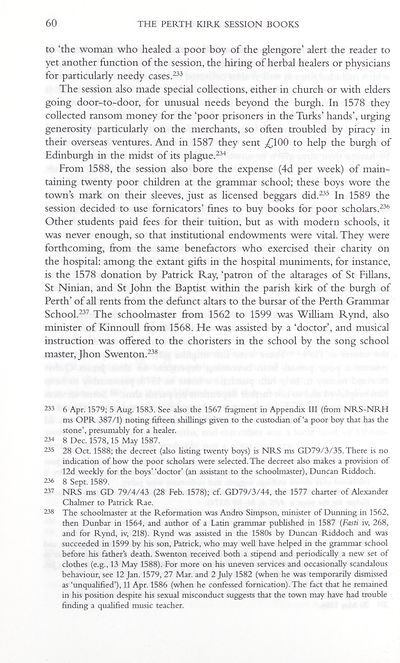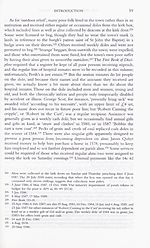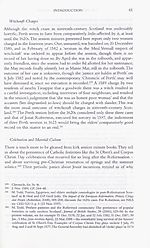Series 6 > Perth Kirk Session books, 1577-1590
(75) Page 60
Download files
Complete book:
Individual page:
Thumbnail gallery: Grid view | List view

60
THE PERTH KIRK SESSION BOOKS
to ‘the woman who healed a poor boy of the glengore’ alert the reader to
yet another function of the session, the hiring of herbal healers or physicians
for particularly needy cases.233
The session also made special collections, either in church or with elders
going door-to-door, for unusual needs beyond the burgh. In 1578 they
collected ransom money for the ‘poor prisoners in the Turks’ hands’, urging
generosity particularly on the merchants, so often troubled by piracy in
their overseas ventures. And in 1587 they sent ,£100 to help the burgh of
Edinburgh in the midst of its plague.234
From 1588, the session also bore the expense (4d per week) of main¬
taining twenty poor children at the grammar school; these boys wore the
town’s mark on their sleeves, just as licensed beggars did.235 In 1589 the
session decided to use fornicators’ fines to buy books for poor scholars.236
Other students paid fees for their tuition, but as with modern schools, it
was never enough, so that institutional endowments were vital. They were
forthcoming, from the same benefactors who exercised their charity on
the hospital: among the extant gifts in the hospital muniments, for instance,
is the 1578 donation by Patrick Ray, ‘patron of the altarages of St Fillans,
St Ninian, and St John the Baptist within the parish kirk of the burgh of
Perth’ of all rents from the defunct altars to the bursar of the Perth Grammar
School.237 The schoolmaster from 1562 to 1599 was William Rynd, also
minister of Kinnoull from 1568. He was assisted by a ‘doctor’, and musical
instruction was offered to the choristers in the school by the song school
master, Jhon Swenton.238
233 6 Apr. 1579; 5 Aug. 1583. See also the 1567 fragment in Appendix III (from NRS-NRH
ms OPR 387/1) noting fifteen shillings given to the custodian of‘a poor boy that has the
stone’, presumably for a healer.
234 8 Dec. 1578,15 May 1587.
235 28 Oct. 1588; the decreet (also listing twenty boys) is NRS ms GD79/3/35. There is no
indication of how the poor scholars were selected. The decreet also makes a provision of
12d weekly for the boys’ ‘doctor’ (an assistant to the schoolmaster), Duncan Riddoch.
236 8 Sept. 1589.
237 NRS ms GD 79/4/43 (28 Feb. 1578); cf. GD79/3/44, the 1577 charter of Alexander
Chalmer to Patrick Rae.
238 The schoolmaster at the Reformation was Andro Simpson, minister of Dunning in 1562,
then Dunbar in 1564, and author of a Latin grammar published in 1587 (Fasti iv, 268,
and for Rynd, iv, 218). Rynd was assisted in the 1580s by Duncan Riddoch and was
succeeded in 1599 by his son, Patrick, who may well have helped in the grammar school
before his father’s death. Swenton received both a stipend and periodically a new set of
clothes (e.g., 13 May 1588). For more on his uneven services and occasionally scandalous
behaviour, see 12 Jan. 1579, 27 Mar. and 2 July 1582 (when he was temporarily dismissed
as ‘unqualified’), 11 Apr. 1586 (when he confessed fornication). The fact that he remained
in his position despite his sexual misconduct suggests that the town may have had trouble
finding a qualified music teacher.
THE PERTH KIRK SESSION BOOKS
to ‘the woman who healed a poor boy of the glengore’ alert the reader to
yet another function of the session, the hiring of herbal healers or physicians
for particularly needy cases.233
The session also made special collections, either in church or with elders
going door-to-door, for unusual needs beyond the burgh. In 1578 they
collected ransom money for the ‘poor prisoners in the Turks’ hands’, urging
generosity particularly on the merchants, so often troubled by piracy in
their overseas ventures. And in 1587 they sent ,£100 to help the burgh of
Edinburgh in the midst of its plague.234
From 1588, the session also bore the expense (4d per week) of main¬
taining twenty poor children at the grammar school; these boys wore the
town’s mark on their sleeves, just as licensed beggars did.235 In 1589 the
session decided to use fornicators’ fines to buy books for poor scholars.236
Other students paid fees for their tuition, but as with modern schools, it
was never enough, so that institutional endowments were vital. They were
forthcoming, from the same benefactors who exercised their charity on
the hospital: among the extant gifts in the hospital muniments, for instance,
is the 1578 donation by Patrick Ray, ‘patron of the altarages of St Fillans,
St Ninian, and St John the Baptist within the parish kirk of the burgh of
Perth’ of all rents from the defunct altars to the bursar of the Perth Grammar
School.237 The schoolmaster from 1562 to 1599 was William Rynd, also
minister of Kinnoull from 1568. He was assisted by a ‘doctor’, and musical
instruction was offered to the choristers in the school by the song school
master, Jhon Swenton.238
233 6 Apr. 1579; 5 Aug. 1583. See also the 1567 fragment in Appendix III (from NRS-NRH
ms OPR 387/1) noting fifteen shillings given to the custodian of‘a poor boy that has the
stone’, presumably for a healer.
234 8 Dec. 1578,15 May 1587.
235 28 Oct. 1588; the decreet (also listing twenty boys) is NRS ms GD79/3/35. There is no
indication of how the poor scholars were selected. The decreet also makes a provision of
12d weekly for the boys’ ‘doctor’ (an assistant to the schoolmaster), Duncan Riddoch.
236 8 Sept. 1589.
237 NRS ms GD 79/4/43 (28 Feb. 1578); cf. GD79/3/44, the 1577 charter of Alexander
Chalmer to Patrick Rae.
238 The schoolmaster at the Reformation was Andro Simpson, minister of Dunning in 1562,
then Dunbar in 1564, and author of a Latin grammar published in 1587 (Fasti iv, 268,
and for Rynd, iv, 218). Rynd was assisted in the 1580s by Duncan Riddoch and was
succeeded in 1599 by his son, Patrick, who may well have helped in the grammar school
before his father’s death. Swenton received both a stipend and periodically a new set of
clothes (e.g., 13 May 1588). For more on his uneven services and occasionally scandalous
behaviour, see 12 Jan. 1579, 27 Mar. and 2 July 1582 (when he was temporarily dismissed
as ‘unqualified’), 11 Apr. 1586 (when he confessed fornication). The fact that he remained
in his position despite his sexual misconduct suggests that the town may have had trouble
finding a qualified music teacher.
Set display mode to:
![]() Universal Viewer |
Universal Viewer | ![]() Mirador |
Large image | Transcription
Mirador |
Large image | Transcription
Images and transcriptions on this page, including medium image downloads, may be used under the Creative Commons Attribution 4.0 International Licence unless otherwise stated. ![]()
| Scottish History Society volumes > Series 6 > Perth Kirk Session books, 1577-1590 > (75) Page 60 |
|---|
| Permanent URL | https://digital.nls.uk/127281537 |
|---|
| Description | Over 180 volumes, published by the Scottish History Society, containing original sources on Scotland's history and people. With a wide range of subjects, the books collectively cover all periods from the 12th to 20th centuries, and reflect changing trends in Scottish history. Sources are accompanied by scholarly interpretation, references and bibliographies. Volumes are usually published annually, and more digitised volumes will be added as they become available. |
|---|


